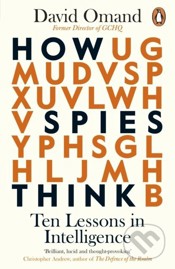How Spies Think: Ten Lessons in Intelligence

I abandoned this a ways in. It just didn’t hold my attention.
From the praise quotes on the back, I gather the author is something of a legend of British intelligence. Weirdly, that becomes a weakness.
Despite the subtitle, the book bogs down under stories. The author has an anecdote and a story for everything, and sometimes I found myself struggling to figure out the current story was related to anything.
For the record, here are the 10 lessons:
- Situational awareness: Our knowledge of the world is always fragmentary and incomplete, and is sometimes wrong
- Explanation. Faces need explaining
- Estimations. Predictions need an explanatory model as well as sufficient data
- Strategic notice: We do not have to be so surprised by surprise.
- It’s our own demons that are likely to mislead us
- We are all susceptible to obsessive states of mind
- Seeing is not always believing: beware manipulations, deception, and faking
- Imagine yourself in the shoes of the person on the other side
- Trustworthiness creates lasting partnerships
- Subversion and sedition are now digital
The first four are an acronym for his SEES methodology.
This is well and good, but the entire thing just collapses under the weight of his story-telling. It doesn’t help that most stories of real intelligence are boring and subtle. It reads like John Le Carre, which might be realistic, but it’s just not interesting.
I think I got through lesson #7, but then felt like I wasn’t getting much out of it.
Book Info
- I have not read this book yet.
- A hardcover copy of this book is currently in my home library.